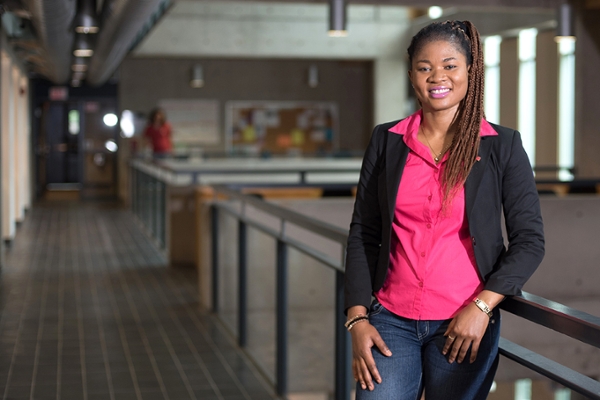
Breaking down barriers
Computer science and empowering people are two unlikely passions to combine, but that’s exactly what Dr. Rita Orji (PhD) has done.
Orji came to the University of Saskatchewan (USask) in 2010 to complete her PhD in computer science. Originally from Nigeria, Orji was finishing her master’s degree in Turkey when we she decided to come to Canada and the main reason she chose to come started during her admissions process.
“I had professors in the department reaching out to me and they kept in communication with me,” she said. “As an international student who’s never been to Canada, any clue you get at that point could be the decision marker. Because professors reached out to me, I felt more at home, I felt like I had known people at the U of S compared to other places that gave me admission around the world.”
Orji came to USask not completely knowing what the focus of her research would be, but by having those professors reach out and make connections, she knew she would be supported in her work no matter what she chose to do.
“That activated the spirit of innovation me,” she said. “I was able to innovate and think without boundaries, explore many possibilities without fear because there were no limitations. I was not afraid of being judged and that actually built me to who I am today.”
Orji eventually decided to focus on human computer interactions, specifically looking into persuasive technology.
“I investigated how we can design interactive systems (mobile applications, social media applications, games) to help people to adopt behaviours and actions that are beneficial to them and their community,” said Orji, whose research has won numerous awards, including the prestigious Vanier Canada Graduate Scholarship.
Orji looks at aspects of people’s lives such as healthy eating, physical activity and discouraging decisions of risky behaviour. After she graduated in 2014, she completed two years of post-doctoral work at Yale University, McGill University and the University of Waterloo. Her post-doctoral work earned her the prestigious Natural Sciences and Engineering Research Council of Canada (NSERC) and Banting fellowships.
Orji is currently an assistant professor in computer science at Dalhousie University. She is working with graduate and undergraduate students to continue her research and expand it to include other areas of persuasive computing for social and public good, such as risky behaviours, mental health, safety and security, and environmental protection.
Along with her research, Orji has been working hard to change the industry she is a part of.
“I want to see a time where we don’t have this thing called visible minority,” said Orji. “I want to be able to serve as a role model to motivate other youths to pursue their dreams irrespective of their background. Your colour does not matter, your gender does not matter. You can actually achieve anything you set your mind on.”
Orji hopes her work will make an impact on policy decision on a national and global scale. She’s been working on this by speaking at places like the United Nations and the Canadian Parliament to get her message and her story out to the public.
“I’m not only a woman and a computer scientist, I am a woman of colour,” she said. “I came from Africa, born and raised by a parent who had no formal education and survived on a very tight budget. So, I broke a lot of barriers and fought a lot of battles to get to where I am. I tell people nothing is impossible; you can really do whatever you want to do. Don’t let anybody tell you it’s not possible. I am evidence that nothing is impossible.”

